Published: 27 April 2017
Demand for accommodation services grew by 3 per cent in 2016
In 2016, accommodation establishments in
Finland recorded 20.3 million overnight stays, of which domestic
tourists accounted for around 14.6 million and foreign tourists for
5.8 million. The foreign demand for accommodation services grew by
4.7 per cent and the domestic demand by 2.4 per cent compared with
the previous year. In all, total demand for accommodation services
grew by 3.1 per cent in 2016.
Thus, the previous years’ slight decrease in the demand for
accommodation services turned into clear growth in 2016. Except for
May and June, the demand increased in all months of the year. In
April, September and November, the growth was around five per cent,
in March, nearly eight per cent and in December, as much as 10 per
cent compared with 2015. In May, the demand for accommodation
services was on level with the previous year and in June, the
demand declined by about two per cent. These figures are data from
Statistics Finland’s statistics on accommodation
establishments and they have been collected from accommodation
establishments with at least 20 beds or caravan pitches with
electricity connection.
Year-on-year changes in nights spent (%) by month 2016/2015
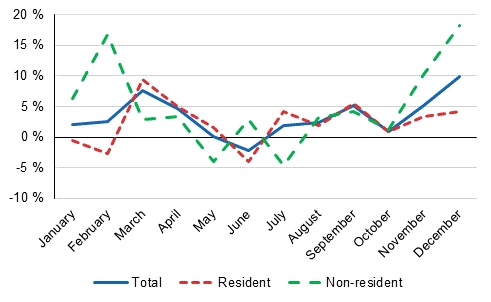
Russians still formed the largest group of foreign visitors in accommodation establishments in 2016
Russians were still the largest group of foreign tourists in Finnish accommodation establishments in 2016. Nearly 698,000 overnight stays were recorded for Russians, which was 11 per cent down on the year before. In 2016, Russian visitors accounted for 12 per cent of all overnight stays by foreign visitors, having been 14 per cent twelve months earlier. As in the previous year, overnight stays of other foreign visitors increased by around seven per cent in 2016. Swedish, German and British visitors came next after Russians. For Swedes and Germans, the number of overnight stays was good 500,000 for both. For both countries, the number of overnight stays remained on level with the previous year. As in the previous year, British visitors’ overnight stays at Finnish accommodation establishments increased by around six per cent and almost exactly half a million overnight stays were recorded for them.
Overnight stays by French tourists numbered 250,000, which was 8.7 per cent more than in 2015. Among the most important countries of inbound tourism to Finland, the biggest growth percentages came from China and the United States. Overnight stays by Chinese tourists increased by around 27 per cent and those by American tourists by 14.4 per cent. Around 232,000 overnight stays each were recorded for these two countries at accommodation establishments. Overnight stays by Japanese tourists increased by 5.4 per cent and they had around 215,000 overnight stays in 2016. Estonians recorded good 190,000 and Norwegians 180,000 overnight stays. Overnight stays by Estonian tourists increased by 2.4 per cent, while those by Norwegian tourists decreased by nearly the same amount. In addition to China, the United States and France, tourism from the Netherlands and Italy also increased clearly in 2016.
Examined by continent, the biggest growth percentage came from Asia, where China and Japan boosted overnight stays to a growth of over 17 per cent, as overnight stays totalled 856,000. For the first time, Asia passed the Nordic countries in the number of overnight stays, from where good 845,000 overnights were recorded, as in the previous year. In total, overnight stays by tourists from EU countries went up by nearly four per cent from 2015, that is, almost 306,000. Tourism from America increased by 12.4 per cent and overnight stays grew to good 330,000. In contrast, tourism from Africa went down slightly and the recorded number of overnight stays by Africans was around 24,000 in 2016.
Change in overnight stays 2016 / 2015, %
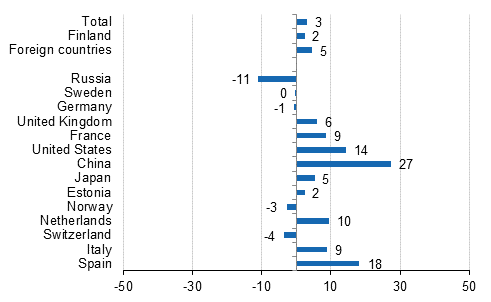
Number of nights spent at hotels totalled 16.3 million in 2016
In 2016, the total number of nights spent in hotels was 16.3 million, which was three per cent higher than in 2015. Recorded nights spent by resident tourists in hotels numbered 11.4 million and by foreign tourists 4.9 million. The number of nights spent by resident tourists increased by 1.7 per cent and that of nights spent by foreign tourists by 6.8 per cent from the previous year. Overnight stays at hotels covered 80 per cent of all overnight stays at accommodation establishments. The share of foreign tourists of overnight stays in hotels was 30 per cent and 28 per cent of all overnight stays at accommodation establishments.
The occupancy rate of hotel rooms for the whole country was 54 per cent in 2016. One year earlier, it was 52.3 per cent. The average price of a hotel room has been growing since 2011, when the average price was EUR 88. In 2016, the average price of a hotel room was EUR 97.
Hotel room occupancy rate and the monthly average price in 2015 and 2016
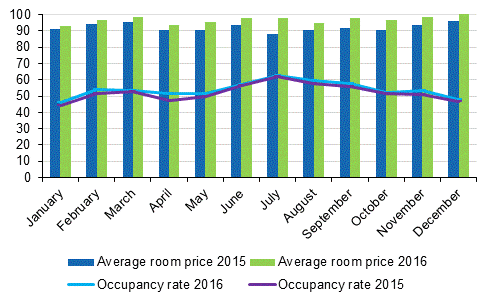
Regional development of overnight stays in 2016
In Mainland Finland, the growth in overnight stays was in 2016
biggest in Lapland, where 13 per cent more overnight stays were
recorded than in 2015. Overnight stays increased by five to ten per
cent in South Karelia, Central Ostrobothnia, Kanta-Häme and North
Ostrobothnia. The capacity of accommodation establishment grew
somewhat in Lapland, Central Ostrobothnia and South Karelia, while
the capacity diminished in Kymenlaakso, Päijät-Häme and
Varsinais-Suomi. In addition, Central Finland, Varsinais-Suomi and
South Ostrobothnia increased the number of overnight stays by
around 3.5 per cent and Uusimaa by 2.3 per cent. Overnight stays
remained almost on level with the previous year in the regions of
Pohjois-Savo, Pirkanmaa, Kainuu and Etelä-Savo. In all other
regions, the numbers of overnight stays went down last year. The
biggest drop in overnight stays, 10 per cent, was recorded in the
region of Kymenlaakso, where the capacity of accommodation
establishments also diminished somewhat. Overnight stays decreased
by 7.7 per cent in Ostrobothnia and by 6.4 per cent in North
Karelia. In Satakunta and Päijät-Häme, one to three per cent fewer
overnight stays were recorded than in 2015.
In Åland, overnight stays increased by 0.4 per cent from the
previous year.
In absolute numbers, overnight stays in accommodation establishments increased most in Lapland, where 310,000 more overnight stays were recorded, and in Uusimaa, where overnight stays increased by 123,000 from 2015.
In Mainland Finland, the share of overnight stays by foreign visitors was highest in Uusimaa and Lapland, 46 per cent, in South Karelia, 28 per cent, and in Etelä-Savo and Ostrobothnia, 20 per cent. With the exception of Ostrobothnia, these regions also recorded most overnight stays by Russians. In Uusimaa, 189,000 overnight stays were recorded for Russians, in South Karelia 140,000, and in Etelä-Savo 77,000. Around 55,000 overnight stays were recorded for Russians in Lapland.
In Ostrobothnia, the share of foreign tourists in all overnight stays was 20 per cent. The share was 18 per cent in Varsinais-Suomi and Kymenlaakso and nearly 17 per cent in North Ostrobothnia. In other regions of Mainland Finland, at most one night in six was spent by a foreign visitor.
Change in overnight stays by region 2016/2015,%
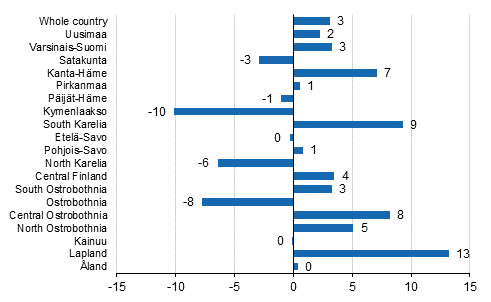
Overnight stays by foreign visitors grew in Finland faster than elsewhere in Europe in 2016
In 2016, overnight stays by foreign visitors in Europe grew by four per cent. In Finland, overnight stays by foreign visitors went up slightly faster than in the rest of Europe, 4.7 per cent. In our neighbouring regions, the Nordic and Baltic countries, the growth amounted to 5.1 per cent. However, overnight stays by foreign tourists were in 2016 still on level with 2012, while in the rest of Europe they have grown by as much as 16 per cent from 2012.
Nights spent by non-residents in Europe (2004 = 100)
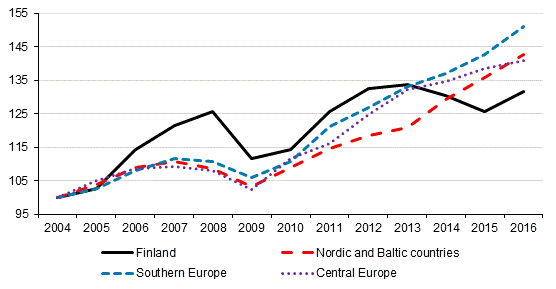
Overnight stays by resident tourists also growing in Europe
Finland did not quite reach the growth rate of Europe in the increase in domestic overnight stays in 2016. Domestic overnight stays in the whole of Europe grew by 3.2 per cent in 2016, while in Finland, the growth amounted to 2.4 per cent. In the area of Nordic and Baltic countries, the growth in domestic overnight stays remained at 2.1 per cent.
The information on overnight stays in other European countries is based on monthly data on the use of capacity at European accommodation establishments collected by Eurostat.
Nights spent by residents in Europe (2004 = 100)
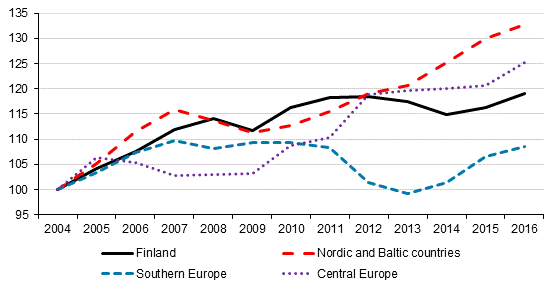
The capacity of accommodation establishments decreased in 2016
In 2016, Statistics Finland’s register of accommodation establishments has been updated with new and closed establishments throughout the year. The number of accommodation establishments contained in the statistics went down by 24 in 2016. However, the room capacity increased by 228 rooms and the number of beds by 1,202 beds. The capacity grew in hotels, while in camping sites and other accommodation establishments the number of establishments, rooms and beds went down compared with 2015.
In 2016, the statistics covered a total of 1,368 accommodation establishments: 653 hotels, 119 guest houses, 328 holiday villages, 230 camping sites and 38 youth hostels. Holiday villages of hotel calibre are included in hotels. The accommodation establishments had 65,754 rooms (or cottages) with a total of 162,482 beds. In addition to the room and bed capacity, the accommodation establishments had 20,806 caravan pitches with electricity connection of which 16,054 were located at camping sites.
When the capacity of accommodation establishments is viewed according to the number of rooms, the statistics contained 1,008 establishments with fewer than 50 rooms and 360 establishments with at least 50 rooms in 2016. Measured by bed capacity, there were 933 establishments with fewer than one hundred beds and 435 establishments with at least one hundred beds.
In 2016, there were 1,084 accommodation establishments that were open year round and 284 establishments that were open part of the year; these were mostly camping sites and holiday villages.
Source: Accommodation Statistics. Statistics Finland
Inquiries: Ossi Nurmi 029 551 2984, liikenne.matkailu@stat.fi
Director in charge: Reetta Moilanen
Publication in pdf-format (526.2 kB)
- Tables
-
Tables in databases
Pick the data you need into tables, view the data as graphs, or download the data for your use.
Appendix tables
- Appendix table 1. Capacity and its utilization in 2016 (27.4.2017)
- Appendix table 2. Nights spent in all establishments in 2016 (27.4.2017)
- Appendix table 3. Hotel capacity and capacity utilization in 2016 (27.4.2017)
- Appendix table 4. Nights spent in hotels in 2016 (27.4.2017)
- Appendix table 5. Visitor arrivals and nights spent by country of residence in 2016 (27.4.2017)
- Appendix table 6. Nights spent in all establishments by month in 2016 (27.4.2017)
- Appendix table 7.1. Nights spent by non-residents and annual change (%) in all establishments in 2016 (27.4.2017)
- Appendix table 7.2. Nights spent by non-residents and annual change (%) in all establishments in 2016 (27.4.2017)
- Appendix table 8.1. Nights spent by non-residents and annual change (%) in hotels in 2016 (27.4.2017)
- Appendix table 8.2. Nights spent by non-residents and annual change (%) in hotels in 2016 (27.4.2017)
- Appendix table 9.1. Capacity of accommodation establishments and capacity utilization by type of establishment in 2016 (27.4.2017)
- Appendix table 9.2. Capacity of accommodation establishments and capacity utilization by type of establishment, May-August 2016 (27.4.2017)
- Appendix table 10.1. Capacity of accommodation establishments by type of establishment in 2016 (27.4.2017)
- Appendix table 10.2. Capacity of accommodation establishments by opening season in 2016 (27.4.2017)
- Appendix table 10.3. Capacity of accommodation establishments by number of bed-places in 2016 (27.4.2017)
- Appendix table 10.4. Capacity of accommodation establishments by number of rooms in 2016 (27.4.2017)
Updated 27.4.2017
Official Statistics of Finland (OSF):
Accommodation statistics [e-publication].
ISSN=1799-6325. 2016. Helsinki: Statistics Finland [referred: 19.4.2025].
Access method: http://stat.fi/til/matk/2016/matk_2016_2017-04-27_tie_001_en.html

